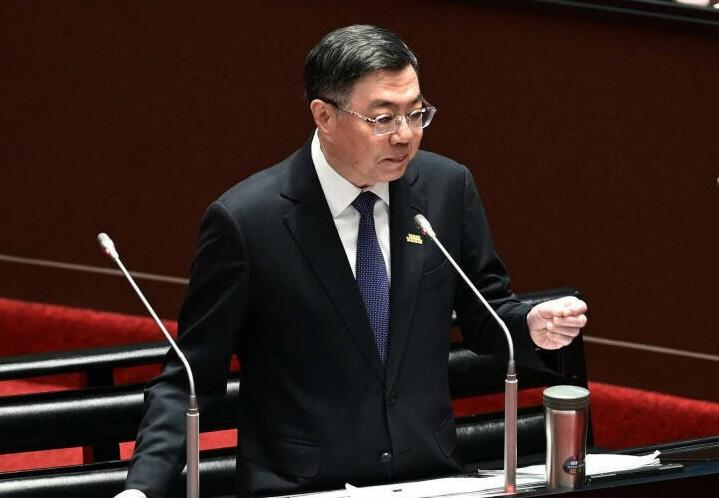Premier Cho Jung-tai (卓榮泰) today said that tariff talks with the US remain focused on three goals: securing a better rate, ensuring a fair process under US trade law and preventing overlapping tariffs.
"Once an agreement is reached, it will be submitted to the Legislative Yuan under the Conclusion of Treaties Act (條約締結法)," Cho told lawmakers during a plenary session of the legislature, urging their support.

Photo: Wang Yi-sung, Taipei Times
The US' "reciprocal" tariff took effect on Aug. 7, and Taiwan negotiated a reduction from the base rate plus 32 percent to the base rate plus a provisional tariff of 20 percent, Cho said.
Some products — including steel, auto parts, pharmaceuticals and semiconductors — are excluded from the tariffs due to national security reasons under Section 232 of the US Trade Expansion Act, although discussions with Washington continue, it added.
A reassessment showed the tariff change reduced projected impacts on "exports, production, GDP and jobs" by about half, but the government would still review sectors comprehensively, he added.
Taiwanese industries most affected include hand tools, machine tools, plumbing hardware, heavy electrical equipment and plastic products, while in agriculture, phalaenopsis orchids (moth orchids), edamame soybeans and mahi-mahi fish are also affected, he said.
Cho said the government would provide relief through a special "resilience" budget and would consider overall employment stability, adding that 73 firms and 2,388 workers have already been directly affected by tariffs.
Technical talks on tariffs, non-tariff trade barriers, trade facilitation and supply chain resilience are largely complete, although a final agreement has not yet been reached, he said.

POSITIVE DEVELOPMENT: Japan and the US are expected to hold in-depth discussions on Taiwan-related issues during the meeting next month, Japanese sources said The holding of a Japan-US leaders’ meeting ahead of US President Donald Trump’s visit to China is positive news for Taiwan, former Japan-Taiwan Exchange Association representative Hiroyasu Izumi said yesterday. After the Liberal Democratic Party’s landslide victory in Japan’s House of Representatives election, Japanese Prime Minister Sanae Takaichi is scheduled to visit the US next month, where she is to meet with Trump ahead of the US president’s planned visit to China from March 31 to April 2 for a meeting with Chinese President Xi Jinping (習近平). Japan and the US are expected to hold in-depth discussions on Taiwan-related issues during the

‘LIKE-MINDED PARTNER’: Tako van Popta said it would be inappropriate to delay signing the deal with Taiwan because of China, adding he would promote the issue Canadian senators have stressed Taiwan’s importance for international trade and expressed enthusiasm for ensuring the Taiwan-Canada trade cooperation framework agreement is implemented this year. Representative to Canada Harry Tseng (曾厚仁) in an interview with the Central News Agency (CNA) said he was increasingly uneasy about Ottawa’s delays in signing the agreement, especially as Ottawa has warmed toward Beijing. There are “no negotiations left. Not only [is it] initialed, we have three versions of the text ready: English, French and Mandarin,” Tseng said. “That tells you how close we are to the final signature.” Tseng said that he hoped Canadian Prime Minister Mark Carney

President William Lai (賴清德) yesterday bestowed one of Taiwan’s highest honors on Saint Vincent and the Grenadines (SVG) Ambassador Andrea Clare Bowman in recognition of her contributions to bilateral ties. “By conferring the Order of Brilliant Star with Grand Cordon on Ambassador Bowman today, I want to sincerely thank her, on behalf of the Taiwanese people, for her outstanding contribution to deepening diplomatic ties between Taiwan and SVG,” Lai said at a ceremony held at the Presidential Office in Taipei. He noted that Bowman became SVG’s first ambassador to Taiwan in 2019 and

A man walks past elementary school artworks at the Taipei Lantern Festival in Ximen District yesterday, the first day of the event. The festival is to run from 5pm to 10pm through March 15.